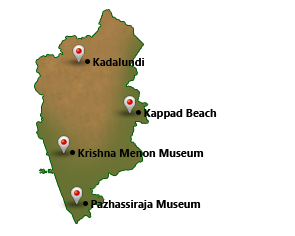Kozhikode is a district of Kerala state, located on the southwest coast of India.
Kozhikode, once known as Calicut, is the district headquarters. Kozhikode district
shares its borders with the districts of Kannur to the north, Wayanad to the east,
and Malappuram to the south.To the west of Kozhikode lies the Arabian Sea. In 2001
the district was divided into four taluks: Kozhikode, Vadakara, Koyilandy and Thamarassery;
but, by the 2011 census there have been twelve block panchayats: Balusseri, Chelannur,
Koduvally, Kozhikode, Kunnamangalam, Kunnummal, Melday, Panthalayani, Perambra,
Thodannur, Thuneri, and Vadakara.
Kozhikode has various temples and mosques in the district that contain sculptures
and inscriptions which are of considerable interest to the students of art. Kozhikode
city itself has many temples, the most important of which are the Tali Temple, Thiruvannur
Temple, Azhakodi Temple, Sree Valayanad Temple, Varakkal Temple, Bilathikulam Temple,
Bhairagi Madam Temple, the Lokanarkavu Temple in Memunda near Vadakara, The Sidda
Samajam in Memunda, Sree Muthappan Payamkuty Mala, in Memunda, Sandbanks Vatakara.
There is an art gallery and Krishna Menon Museum located at East Hill in Kozhikode.
Lalitha Kala Academy also has an art gallery adjacent to the Kozhikode town hall.
The Indian Business Museum is also located in Kozhikode. There is a planetarium,
situated in the heart of the city near Jaffer Khan Colony. Kozhikode Beach and Mananchira
Square and the recently developed Sarovaram park are other popular gathering spots.
TOURIST SPOTS IN KOZHIKODE
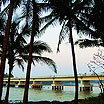
Kadalundi :-The Kadalundi Bird Sanctuary is 19 km from Kozhikode and is spread
over a cluster of islands and is surrounded by hillocks, where the River Kadalundi
flows into the Arabian Sea.
Kadalundi:
The Kadalundi Bird Sanctuary is 19 km from Kozhikode and is spread over a cluster
of islands and is surrounded by hillocks, where the River Kadalundi flows into the
Arabian Sea. The place is locally known as Kadalundi Nagaram. There are a variety
of native birds and migratory birds like terns, seagulls, sand plovers etc. Different
kinds of flora and fauna and varieties of fishes,crabs and mussels are also found
here.
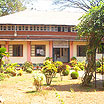
Krishna Menon Museum :-The Krishna Menon Museum, established in 1975, was
to honour the former Indian leader, V. K. Krishna Menon. It is situated in East
Hill, about 5 km from the city centre.
Krishna Menon Museum
The Krishna Menon Museum, established in 1975, was to honour the former Indian leader,
V. K. Krishna Menon. It is situated in East Hill, about 5 km from the city centre.
It is situated next to the Pazhassi Raja Museum that is an art gallery housing the
oil paintings of Raja Ravi Varma, among other collections. A section of the museum
is dedicated to V. K. Krishna Menon, which preserves and displays the souvenirs
gifted to him. It also houses most of his personal belongings. The art section of
the museum displays ravelled woodcarvings, ivory art objects, elegant paintings
like Kerala mural paintings and modern painting.
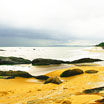
Kappad Beach :-The fact that it was the place where Vasco da Gama, the famous
world explorer first set his foot, makes the Kappad beach very popular.
Kappad Beach
The fact that it was the place where Vasco da Gama, the famous world explorer first
set his foot, makes the Kappad beach very popular. A stone monument is built on
the beach to commemorate the significant historical event. This beach is locally
known as Kappakkadavu. It is the gateway to the Malabar Coast. Tourists can reach
Kappad by availing the backwaters that offers an enjoyable experience.
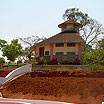
Pazhassiraja Museum :-The art gallery and museum named after Pazhassiraja Kerala Varma of the Padinjare Kovilakom of the royal family of Kottayam is situated in East Hill, about 5 km from the Kozhikhode town.
Read More
Pazhassiraja Museum
The art gallery and museum named after Pazhassiraja Kerala Varma of the Padinjare
Kovilakom of the royal family of Kottayam is situated in East Hill, about 5 km from
the Kozhikhode town. It is house to several archaeological and historical artefacts
that are noteworthy to the region such as the old paintings, antique bronzes, ancient
umbrella stones, gold coins, and monuments that are megalithic in nature such as
the dolmonoid cysts. Pazhassiraja was known for leading the renowned ‘Pazhassi Revolt’
and introducing guerrilla warfare against the British colonialism.
.png)






